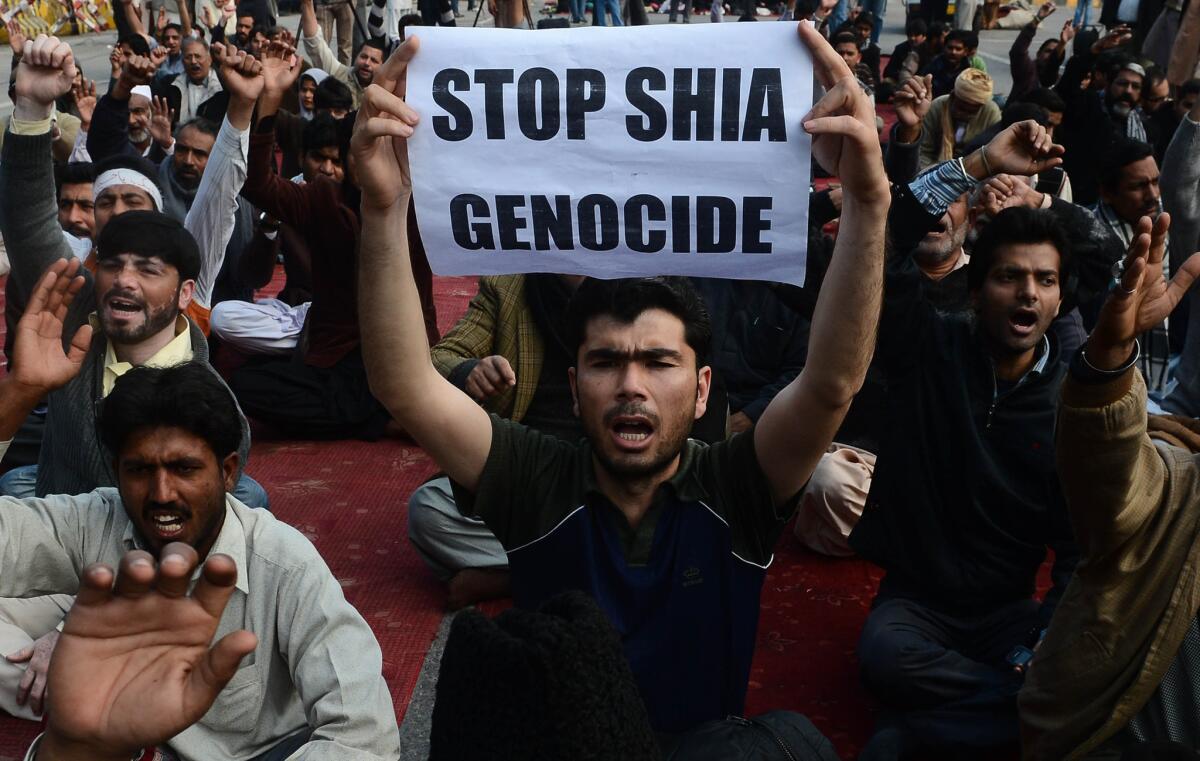Pakistan militants kill 5 in attack on tribal official’s compound

- Share via
ISLAMABAD, Pakistan -- Militants disguised as policemen stormed the compound of a top tribal region official in the northwest city of Peshawar on Monday and killed five police officers, the latest outbreak of violence to rattle the country as its civilian government struggles to ensure security ahead of national elections this spring.
The raid on the offices of the chief administrative official for the Khyber tribal region came as the country’s Shiite Muslim community continued nationwide demonstrations over the killing of more than 80 people in a massive bomb blast in a Shiite neighborhood in the southwest city of Quetta on Saturday.
Relatives of those killed protested alongside the coffins of the victims, refusing to bury them until the government clamps down on Sunni Muslim militants who for years have been terrorizing Pakistan’s Shiite community.
Refusing to immediately bury the victims is seen as a profound expression of the families’ grief and anger over the killings, because Muslim traditions require that the dead to be buried as quickly as possible.
Relatives of Shiites killed in twin suicide bomb attacks at a billiards hall in Quetta in January carried out an identical protest afterward, eventually prompting Prime Minister Raja Pervez Ashraf to oust the provincial government in Balochistan, transfer power to a federally appointed governor and deploy paramilitary troops to track down militants responsible for the bombings. Quetta is Balochistan’s provincial capital.
The attack on the offices of Khyber Political Agent Mutahir Zeb occurred while he was meeting with other political leaders to discuss arrangements for upcoming elections, according to witnesses.
The militants who attacked were dressed in uniforms worn by Levies, a police force deployed in Pakistan’s tribal areas along the Afghan border, as well as at Zeb’s compound, they said.
The attackers entered the compound just as a van carrying prisoners drove through the main gate, witnesses said. Two of the militants detonated explosives-filled suicide vests while inside the compound, local officials said. In addition to the five officers killed, seven others were injured in the attack, said Javid Marwat, a Peshawar administrative official.
No group claimed responsibility for the Peshawar attack. The Khyber tribal region remains a stronghold for Pakistani Taliban fighters and another local militant group, Lashkar-e-Islam.
In Quetta, a top Shiite leader, Allama Ameen Shahidi, told reporters that “the state has failed to protect its citizens,” and demanded that the government launch a crackdown on Sunni extremists in Balochistan and hand over authority in Quetta to the Pakistani army.
Anger within the Shiite community over Saturday’s bomb blast in Quetta spread to other cities. Much of Karachi, Pakistan’s largest city and its commercial capital, came to a standstill Monday as businesses heeded Shiite leaders’ call for a work shutdown. Shiites also carried out sit-in demonstrations in Karachi and other major cities, blocking major roads and rail lines.
For years, Pakistan’s Shiite community has been targeted by Sunni extremist groups that see Shiites as heretics. One of those groups, Lashkar-e-Jhangvi, claimed responsibility for the bomb blast in Quetta on Saturday, as well as for the twin bombings in Quetta in January, which killed more than 90 people. In Balochistan, the majority of Shiites belong to the Hazara community, an ethnic group with roots in neighboring Afghanistan.
The rise in extremist violence in recent months -- carried out by both sectarian outfits and anti-state groups such as the Pakistani Taliban -- has reinforced concerns by many Pakistanis about the ability of President Asif Ali Zardari to curb militancy, and comes at a critical juncture for the Pakistani leader, just as the ruling Pakistan People’s Party prepares its bid for another five-year term in power. National elections are slated for sometime in May.
On Monday, Zardari ordered Balochistan Governor Nawab Zulfiqar Ali Magsi to “take all necessary measures for the security of the Hazaras,” according to a statement released by Zardari’s office.
Human rights activists, however, say Zardari’s remarks aren’t likely to reassure a Shiite community that has been devastated by sectarian attacks in recent years and has seen little action taken against Sunni extremist groups such as Lashkar-e-Jhangvi.
Last year, more than 400 Shiites in Pakistan were killed in sectarian attacks, according to Human Rights Watch. So far this year, sectarian violence in Pakistan has already claimed the lives of more than 170 Shiites.
In a prepared statement released Monday, the Human Rights Commission of Pakistan said the bomb blast in Quetta on Saturday “highlights the consequences of the government’s failure to crack down on known militant outfits.
“That also ought to be enough for any society that puts a premium on human life to hang its head in shame,” the commission stated. “In such a society, heads would have rolled. Not so in Pakistan.”
ALSO:
Pope blesses thousands as details of ailments emerge
U.S. general is willing to curb airstrikes in Afghan villages
Venezuela releases first photos of Hugo Chavez after surgery
Staff writer Alex Rodriguez reported from Islamabad. Special correspondent Zulfiqar Ali reported from Peshawar, Pakistan.
More to Read
Sign up for Essential California
The most important California stories and recommendations in your inbox every morning.
You may occasionally receive promotional content from the Los Angeles Times.










